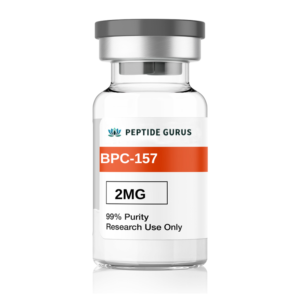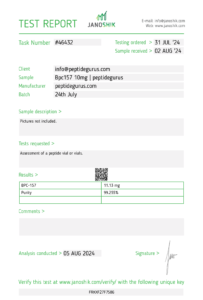Gastrointestinal health is a crucial aspect of overall well – being, and disorders of the digestive system can significantly impact a person’s quality of life. In recent years, the BPC – 157 peptide has emerged as a subject of great interest in gastrointestinal health research. This article will explore the role of
BPC – 157 in gastrointestinal health, its properties, research findings, and how it aligns with FDA guidelines.
BPC – 157 is a stable gastric pentadecapeptide. It is derived from a protein found in the stomach, which gives it unique properties related to the digestive system. Although the exact chemical formula and more detailed structural information are not always readily publicized in a consumer – facing context, its origin from the stomach indicates its potential to interact with the body’s natural digestive processes.
In the context of gastrointestinal health, BPC – 157 works through multiple mechanisms. One of its key functions is enhancing the healing of damaged tissues in the digestive tract. It promotes the spread and proliferation of fibroblasts. Fibroblasts are cells that play a crucial role in the development of the extracellular matrix, which is essential for tissue repair. By increasing the activity of fibroblasts, BPC – 157 speeds up the repair process of damaged gastrointestinal tissues.
Another important mechanism is its ability to improve blood vessel growth, a process known as angiogenesis. In the digestive tract, an adequate blood supply is vital for delivering nutrients to the tissues and removing waste products. BPC – 157’s role in angiogenesis ensures that the damaged tissues receive the necessary resources for healing.
Furthermore, BPC – 157 has anti – inflammatory properties. Chronic inflammation is a common factor in many gastrointestinal disorders. By reducing inflammation, BPC – 157 helps in alleviating the symptoms of these disorders and promoting the overall health of the digestive system. It also has cytoprotective properties, especially in the gastrointestinal tract. It helps maintain the integrity of the mucosal barriers, protecting them from the harmful effects of pepsin and other digestive acids.
Gastric ulcers are painful sores that develop on the lining of the stomach. Research has shown that BPC – 157 can be effective in protecting against and healing gastric ulcers. It acts systemically in the digestive tract to enhance the mucosal defense mechanisms. The peptide helps to repair the damaged tissue by promoting fibroblast activity and angiogenesis. In animal studies, BPC – 157 has been shown to reduce the size and number of gastric ulcers, indicating its potential as a treatment option.
Inflammatory bowel diseases, such as Crohn’s disease and ulcerative colitis, are chronic inflammatory conditions of the digestive tract. BPC – 157 has shown promise in managing these diseases. Its anti – inflammatory properties help reduce the inflammation in the intestines, which is a key feature of IBD. By promoting tissue repair and maintaining the integrity of the mucosal barriers, BPC – 157 may help improve the symptoms of IBD patients, such as abdominal pain, diarrhea, and rectal bleeding.
Leaky gut syndrome is a condition where the intestinal barrier becomes more permeable, allowing toxins and bacteria to leak into the bloodstream. BPC – 157 can help in treating leaky gut syndrome. Its cytoprotective properties help strengthen the mucosal barriers in the intestines, reducing the permeability. This, in turn, helps prevent the leakage of harmful substances into the bloodstream and improves the overall health of the digestive system.
As of July 2024, BPC – 157 is not approved by the FDA for human use. The FDA has strict guidelines for the approval of new drugs and biologics. For BPC – 157 to be considered for approval, it would need to undergo extensive pre – clinical and clinical studies.
Pre – clinical studies involve testing on cell cultures and animal models to evaluate the safety and efficacy of BPC – 157. These studies would need to determine the optimal dosage, potential side effects, and the most effective route of administration. Clinical trials in humans would then follow a rigorous three – phase process. Phase 1 trials focus on testing the safety of the substance in a small group of healthy volunteers. Phase 2 trials expand the study to a larger group of patients with the target condition to evaluate efficacy and further assess safety. Phase 3 trials are large – scale, multi – center studies to confirm the effectiveness and safety of the treatment.
Manufacturers also need to adhere to Good Manufacturing Practice (GMP) guidelines. This ensures that the BPC – 157 produced is of high quality, with consistent purity and activity levels.
Answer: No, BPC – 157 is currently only for research use. It has not been approved by the FDA for human consumption. Self – administering BPC – 157 to treat stomach problems can be dangerous as its safety and efficacy for human use have not been fully established.
Answer: Since BPC – 157 is still in the research stage for human use, its full side – effect profile is not known. However, in animal studies, no major adverse effects have been reported so far. But it’s important to note that what is observed in animals may not necessarily apply to humans.
Answer: It’s difficult to say. BPC – 157 first needs to complete extensive pre – clinical and clinical studies and meet FDA approval requirements. If all goes well, it may take several years or more before it becomes available as a treatment option.

